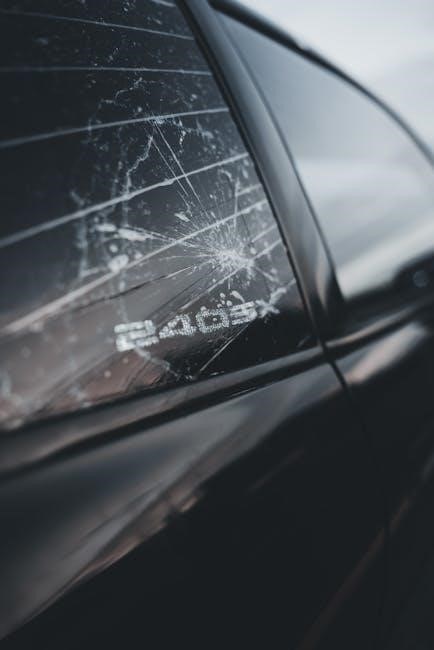A private settlement for a car accident is a legally binding, out-of-court agreement resolving liability and damages. It avoids litigation, offering a faster, more efficient resolution process.
1.1 Definition of Private Settlement
A private settlement for a car accident is a legally binding agreement between parties involved in a car accident, resolving liability and damages without court intervention. It is a voluntary, out-of-court resolution where parties agree to settle claims amicably. This type of settlement is often reached through direct negotiation or with the assistance of legal counsel. Once signed, it becomes a formal contract, finalizing the matter and preventing future legal claims. Private settlements aim to provide a swift and cost-effective solution for all parties involved.
1.2 Importance of Private Settlement in Car Accidents

A private settlement in car accidents offers a swift and cost-effective resolution, avoiding lengthy court proceedings and high legal fees. It allows parties to negotiate mutually acceptable terms, ensuring both sides are satisfied. Private settlements prevent the uncertainty of court outcomes and protect privacy by keeping details confidential. They also reduce stress and emotional strain, enabling victims to focus on recovery. Additionally, private settlements can preserve relationships between parties, fostering amicable resolutions without adversarial conflicts. This approach is particularly beneficial for minor accidents or when liability is clear, providing a fair and efficient solution for all involved.
1.3 Brief Overview of the Process
A private settlement for a car accident typically begins with an assessment of damages, including medical bills, property damage, and lost wages. Parties then negotiate directly or through representatives to reach a mutually acceptable agreement. A settlement letter or agreement is drafted, outlining liability, payment terms, and release of claims. Once signed, the agreement is legally binding, preventing further legal action. This process avoids court involvement, saving time and costs. Digital tools and templates can facilitate document creation and signing, ensuring a smooth and efficient resolution.

Understanding Private Settlement Agreements
A private settlement agreement is a legally binding contract resolving car accident disputes out of court, addressing liability and compensation without litigation. It ensures mutual acceptance of terms and closure.
2.1 What is a Car Accident Settlement Agreement?
A car accident settlement agreement is a legally binding contract between parties involved in a car accident, outlining financial responsibilities and compensation. It finalizes disputes out of court, avoiding litigation. The agreement typically includes details of damages, injuries, and payment terms. Once signed, it releases both parties from further legal claims, ensuring a mutually accepted resolution. This document is crucial for resolving disputes efficiently and amicably, protecting both parties from future legal actions related to the accident.
2.2 Key Components of a Private Settlement Agreement
A private settlement agreement for a car accident typically includes personal information of both parties, a detailed description of the accident, and the agreed-upon compensation. It outlines the payment terms, release of liability, and a waiver of future claims. The agreement must be signed by all involved parties and may require witnesses or notarization for validity. It ensures a clear understanding of responsibilities and compensation, preventing further legal disputes. These components are essential to create a legally binding and enforceable document.
2.3 Differences Between Formal and Informal Settlements
A formal settlement involves legal processes, often with court oversight, and typically includes insurance companies or legal counsel. It is detailed, with clear terms and enforceable by law. Informal settlements, however, are private agreements between parties without legal intervention. They are simpler, faster, and rely on mutual trust. While formal settlements offer legal protection, informal ones lack enforceability if a party reneges. The choice depends on the accident’s complexity, the parties’ willingness to cooperate, and the need for a legally binding resolution.

The Process of Reaching a Private Settlement
The process involves negotiation, documentation, and mutual agreement, allowing parties to resolve disputes efficiently without court intervention, ensuring a fair and legally binding outcome.
3.1 Steps to Initiate a Private Settlement
Initiating a private settlement begins with assessing damages and determining fault. Both parties should gather evidence, such as accident reports and medical bills, to support their claims. Communication is key, often starting with a demand letter outlining the incident and requested compensation. If the at-fault party agrees, negotiations ensue to reach a mutually acceptable agreement. It’s crucial to involve legal counsel to ensure fairness and legality. Once terms are agreed upon, a written settlement agreement is drafted and signed, finalizing the resolution without court involvement.
3.2 Negotiation Strategies for a Fair Settlement
Negotiation is crucial for achieving a fair private settlement. Start by clearly understanding your case’s value, including medical expenses, lost wages, and pain and suffering. Present evidence like accident reports, bills, and witness statements to support your claim. Be prepared to compromise but know your minimum acceptable amount. Maintain open communication and avoid emotional arguments. If negotiations stall, consider mediation or legal assistance. A well-prepared, evidence-based approach ensures a balanced and fair outcome, protecting your rights while fostering mutual agreement.

3.3 Role of Insurance Companies in Private Settlements
Insurance companies play a pivotal role in private car accident settlements, often handling negotiations to avoid court. They assess claims, review evidence, and determine fair compensation. Their goal is to protect their policyholder’s interests while minimizing payouts. Insurers may offer settlements quickly to resolve cases efficiently. However, their primary focus is on their client’s liability, which can sometimes lead to lower offers. It’s essential to understand their strategies and ensure all terms are clear and legally binding to avoid future disputes. Their involvement can streamline the process but requires careful scrutiny to ensure fairness.
Legal Considerations in Private Settlements
Private car accident settlements are legally binding, requiring careful review of liability, fault, and release terms. Legal advice ensures agreements are enforceable and fair for all parties involved.
4.1 Legally Binding Nature of Settlement Agreements
A private car accident settlement agreement is a legally binding contract that finalizes the case outside of court. Once signed, it is enforceable and prevents either party from pursuing further legal action. The agreement outlines the terms of compensation, liability, and release of claims, ensuring all parties are held accountable. Breaching the agreement can result in legal consequences. It is crucial to review the document thoroughly, as it permanently resolves the dispute. Legal advice is recommended to ensure the agreement is fair and aligns with the law, protecting the rights of all involved parties.
4.2 Liability and Fault Determination
Liability and fault determination are critical in private car accident settlements. Both parties must establish who is responsible for the accident to allocate compensation fairly. Evidence such as police reports, witness statements, and medical records is used to assess fault. In some cases, comparative fault laws apply, reducing compensation based on shared liability. Determining fault accurately ensures the settlement reflects the true circumstances of the accident. Legal advice is recommended to navigate this process effectively and protect your rights. A clear understanding of liability is essential for a fair and enforceable agreement.
4.3 Release of Liability and Waivers
A release of liability, or waiver, is a document signed in a private car accident settlement to release one or both parties from future legal claims. It ensures that once the settlement is finalized, no further legal action can be taken. The agreement must clearly outline the terms under which liability is released. Legal advice is essential to ensure the document is enforceable and protects your rights. Signing a release of liability is a binding commitment, making it crucial to understand its implications before agreeing to the terms.
Templates and Forms for Private Settlement
Templates for car accident settlements include letters, agreements, and release forms. These documents help structure negotiations and ensure all terms are clearly outlined for legal validity.
5.1 Car Accident Settlement Letter Template
A car accident settlement letter template is a formal document outlining your claim for compensation. It includes personal information, accident details, and a demand for financial recovery. The letter serves as a crucial negotiation tool, presenting your case to the at-fault party’s insurance company. Key elements include a clear description of the incident, medical expenses, lost wages, and property damage. The template ensures your demands are structured and professional, helping to facilitate a fair settlement. Customize it with specific details to strengthen your case and streamline the negotiation process.
5.2 Private Settlement Agreement Form
A private settlement agreement form is a legally binding document outlining the terms of a car accident resolution. It includes details like liability, payment amounts, and release of claims. This form ensures both parties agree to settle disputes amicably without court involvement. It is customizable to fit specific accident circumstances, protecting both parties from future claims. The form is often used by attorneys and insurance agents to facilitate quick and fair resolutions. By signing, both parties acknowledge the agreement’s terms, finalizing the settlement process efficiently.
5.3 Release of Liability Form
A release of liability form is a legally binding document used to finalize a private car accident settlement. It ensures that once signed, neither party can pursue further legal action related to the incident. This form typically includes details of the parties involved, the accident, and the agreed-upon settlement terms. It protects both sides by providing a clear record of the agreement and preventing future claims. The form is often used in private settlements to ensure a smooth and legally recognized resolution, avoiding court involvement and potential disputes.

Factors Influencing Private Settlement Amounts
Private settlement amounts are influenced by the extent of damages, evidence strength, and insurance coverage. These factors determine the compensation for injuries, property damage, and other related costs.
6.1 Assessing Damages and Losses
Assessing damages and losses is crucial in determining private settlement amounts. This includes evaluating medical bills, property damage, lost wages, and pain and suffering. Evidence like invoices, medical records, and expert reports supports these claims. The extent of liability and insurance coverage also influence the final amount. Accurate documentation ensures fair compensation, while overlooking details can lead to undervalued settlements. A thorough assessment balances both tangible and intangible losses, ensuring the settlement reflects the true impact of the accident on all parties involved.
6.2 Role of Evidence in Determining Settlement Amounts
Evidence plays a critical role in determining private settlement amounts for car accidents. Medical records, invoices, and expert reports document the extent of injuries and damages. Police reports and witness statements establish liability, while lost wage documentation supports income loss claims. Photographic evidence of vehicle damage and accident scenes further substantiates claims. The strength and thoroughness of evidence directly impact the settlement amount, ensuring fair compensation. Without robust evidence, parties risk undervaluing their claims or facing disputes during negotiations.
6.3 Impact of Insurance Coverage on Settlements
Insurance coverage significantly influences private car accident settlements, as it determines the financial limits within which compensation can be sought. If the at-fault party has insufficient or no insurance, the settlement amount may be limited, affecting the claimant’s ability to recover full damages. In such cases, claimants may only receive partial compensation, leaving them to cover remaining losses independently. Insurance companies often aim to minimize payouts, which can impact negotiation outcomes. Understanding policy limits and their implications is crucial for assessing the viability of a private settlement and ensuring fair compensation.

Risks and Challenges of Private Settlements
Private settlements may lead to unfair compensation, waived future claims, or overlooked legal rights, emphasizing the need for careful negotiation and legal guidance to protect interests.
7.1 Potential Drawbacks of Settling Privately
Private settlements may result in inadequate compensation, as parties might underestimate damages or overlook future expenses. Without legal oversight, agreements can lack enforceability, leaving victims vulnerable. Additionally, settling privately often waives the right to pursue further claims, even if new injuries or damages emerge. There’s also a risk of unfair terms if one party has more bargaining power. Moreover, insurance companies may not always honor informal agreements, leading to disputes. Victims might also miss out on legal protections, such as punitive damages, which are typically unavailable in private settlements. This underscores the importance of legal guidance to ensure fair outcomes.
7.2 Risks of Not Involving Legal Counsel
Not involving legal counsel in a private car accident settlement can lead to unfair outcomes, as individuals may unknowingly accept lowball offers or overlook future damages. Without legal guidance, parties may not fully understand their rights or the long-term implications of the agreement. Insurance companies may exploit this lack of representation to minimize payouts. Additionally, unsigned or poorly drafted agreements can be unenforceable, leaving victims without recourse. Legal counsel ensures that settlements are fair, comprehensive, and legally binding, protecting against potential disputes or financial shortfalls down the line.
7.3 Consequences of Unsigned or Unenforceable Agreements
Unsigned or unenforceable agreements in private car accident settlements can lead to severe legal and financial repercussions. Without a valid signature, the agreement lacks legal standing, allowing either party to renege on the terms. This can result in continued disputes, potential lawsuits, and additional legal fees. Furthermore, unenforceable agreements may leave victims without compensation for their damages or injuries. Ensuring that all parties sign the agreement and that it meets legal standards is crucial to avoid these consequences and guarantee a binding resolution to the car accident claim.
Case Studies and Real-Life Examples
Real-life examples demonstrate how private settlements resolved car accident disputes amicably, providing fair compensation and avoiding lengthy litigation, as seen in successful cases like the Rs1.25 crore settlement.
8.1 Successful Private Settlement Examples
A notable example is the Rs1.25 crore settlement awarded to a widow in Pune after her husband’s fatal car accident. This case highlights how private settlements efficiently resolve disputes. Another example involves a couple killed by a falling sign, leading to a settlement with multiple parties. These cases demonstrate how private agreements can provide fair compensation without prolonged litigation, ensuring closure for victims’ families. Such examples underscore the effectiveness of private settlements in achieving swift, amicable resolutions.
8.2 Lessons Learned from Failed Settlements
Failed private settlements often stem from insufficient evidence, rushed agreements, or lack of legal counsel. One case involved a victim accepting a low offer without medical evaluation, later discovering severe injuries. Another failed due to unclear liability terms, leading to unresolved disputes. These examples highlight the importance of thorough documentation, professional negotiation, and legal oversight. Ensuring all damages are accounted for and agreements are legally binding is crucial to avoid future complications. Learning from these failures emphasizes the need for careful preparation and expert guidance in private settlements.
8.3 How Real People Have Benefited from Private Settlements
Many individuals have successfully resolved car accident disputes through private settlements, avoiding lengthy court battles. For instance, a victim of a minor collision used a private settlement letter to negotiate fair compensation for repairs and medical bills. Another case involved a driver who, with legal guidance, secured a prompt payout without legal fees. These examples demonstrate how private settlements can provide swift, cost-effective solutions, allowing individuals to move forward without financial strain. Properly structured agreements ensure both parties achieve satisfactory outcomes, highlighting the practical benefits of this approach.

Protecting Your Rights in a Private Settlement
Understanding your legal rights ensures fair compensation and prevents future claims. A legally binding agreement protects both parties, guaranteeing a resolution that honors the agreed terms.
9.1 Understanding Your Legal Rights
Understanding your legal rights is crucial in a private settlement for a car accident. You are entitled to fair compensation for damages, medical bills, and lost wages. A private settlement agreement must clearly outline these entitlements to ensure transparency and fairness. It’s important to recognize that signing a settlement releases the at-fault party from further liability, making it essential to agree on terms that fully cover your losses. Consulting legal counsel can help you navigate the process and ensure your rights are protected throughout the negotiation and agreement.
9.2 When to Seek Legal Advice
Seeking legal advice is crucial when navigating a private settlement for a car accident, especially if the situation is complex or involves significant injuries. An attorney can help ensure the agreement is fair and legally sound. If the other party or their insurance company is uncooperative, legal counsel can advocate for your rights. Additionally, if there’s disagreement over fault or the settlement amount, an attorney can negotiate on your behalf. Legal advice is also essential if you’re unsure about the terms or long-term implications of the agreement, ensuring you avoid unfair or binding conditions.
9.3 Ensuring Fair Compensation
Ensuring fair compensation in a private car accident settlement requires careful evaluation of damages, including medical bills, lost wages, and pain and suffering. It’s important to document all expenses and losses to support your claim. Consulting with an attorney can help you assess the true value of your case and negotiate a settlement that reflects your needs. Avoid accepting offers that don’t cover all your losses, as this could leave you with unresolved financial burdens. A fair settlement should address both immediate and future costs related to the accident.
Role of Attorneys in Private Settlements
Attorneys play a crucial role in private settlements by negotiating fair compensation, providing legal expertise, and ensuring clients’ rights are protected throughout the settlement process.
10.1 Benefits of Hiring a Car Accident Attorney
Hiring a car accident attorney provides expertise in navigating private settlements, ensuring fair compensation, and protecting legal rights. Attorneys negotiate effectively, handle complex paperwork, and maximize settlement amounts. They offer objective advice, reducing stress and ensuring clients avoid lowball offers. With their knowledge of legal processes, attorneys can identify critical evidence and argue for higher payouts. Their involvement often leads to more favorable outcomes, making the settlement process smoother and less daunting for victims. Ultimately, attorneys safeguard clients’ interests, ensuring they receive the compensation they deserve.
10.2 How Attorneys Negotiate Better Settlements
Attorneys negotiate better settlements by leveraging their expertise, evidence, and negotiation tactics. They draft compelling demand letters, highlighting damages and liability, to initiate discussions. By presenting strong evidence, such as medical records and witness statements, attorneys demonstrate the case’s strength, encouraging higher offers. They also employ strategic negotiation techniques, countering lowball offers and advocating for fair compensation. Attorneys’ experience in dealing with insurance companies and understanding of legal nuances enables them to secure more favorable terms, ensuring clients receive the maximum compensation they deserve for their injuries and losses.
10.3 When to Involve an Attorney in Private Settlements
Involve an attorney in private settlements when facing complex liability disputes, significant injuries, or low insurance offers. Attorneys ensure fair compensation by negotiating with insurers and protecting your rights. They handle legal complexities, preventing overlooked damages. If the settlement seems unfair or the process overwhelming, legal expertise is crucial. Attorneys also safeguard against future claims, ensuring agreements are legally binding. Their involvement guarantees a thorough review of terms, preventing costly mistakes and securing a favorable outcome for your car accident settlement.

Tax Implications of Private Settlements
Understanding the tax implications of private settlements is crucial. Settlement payments may be taxable, depending on the nature of damages. Non-taxable damages include physical injuries, while others may require reporting to tax authorities.
11.1 Tax Treatment of Settlement Payments
The tax treatment of settlement payments varies based on the type of damages awarded. Compensation for physical injuries is generally non-taxable, while amounts for pain, suffering, or lost wages may be taxable. It’s important to distinguish between punitive damages, which are typically taxable, and compensatory damages, which may be tax-free. Consulting a tax professional is essential to ensure compliance with IRS regulations and to accurately report settlement amounts on tax returns. Proper documentation and understanding of tax implications can help avoid legal or financial issues post-settlement.
11.2 Understanding Taxable and Non-Taxable Damages

In a private car accident settlement, damages are categorized as taxable or non-taxable. Non-taxable damages typically include compensation for physical injuries, medical expenses, and property damage, as these are considered direct restitution. Taxable damages, however, may include punitive damages, which are intended to punish the at-fault party, and certain non-physical damages like emotional distress. Understanding this distinction is crucial for accurate tax reporting. Consulting a tax professional ensures compliance with IRS regulations and helps avoid unexpected tax liabilities. Proper classification of damages is essential for both parties to navigate the settlement’s financial implications effectively.
11.3 Reporting Settlements to Tax Authorities
Reporting a private car accident settlement to tax authorities is essential for compliance. The IRS requires documentation of taxable damages, such as punitive damages or non-physical injuries, using specific forms. Non-taxable damages, like medical expenses, are typically exempt. Accurate reporting ensures transparency and avoids legal issues. Both parties must disclose settlement details, with the payer often issuing IRS Form 1099 for taxable amounts. Consulting a tax professional helps navigate complex reporting requirements, ensuring all obligations are met and preventing future disputes or penalties. Proper documentation is crucial for a smooth and lawful settlement process.
Digital Tools for Creating Private Settlement Documents
Digital tools streamline creating private settlement documents. Online templates, PDF editors, and e-signature tools enable customization, efficiency, and legally binding agreements with minimal effort required.
12.1 Online Templates for Private Settlement Agreements
Online templates simplify creating private settlement agreements for car accidents. These templates provide pre-drafted language and structures, allowing users to input specific details like personal information, accident circumstances, and payment terms. They often include sections for liability acknowledgment, release of claims, and signatures. Many platforms offer customizable templates, ensuring the agreement meets legal standards. Using online templates saves time, reduces errors, and streamlines the process. They are particularly useful for individuals without legal expertise, offering a user-friendly way to finalize settlements efficiently and professionally.
12.2 PDF Editors for Customizing Settlement Forms
PDF editors are essential tools for customizing settlement forms, enabling users to edit, add text, and e-sign documents. Popular options like Adobe Acrobat, DocHub, and Smallpdf allow precise modifications to templates, ensuring all details align with the specific case. These editors support adding personal information, accident specifics, and payment terms. They also facilitate saving documents to the cloud or printing them for physical signatures. By using PDF editors, individuals can ensure their settlement forms are clear, professional, and legally sound, avoiding potential disputes or misunderstandings in the agreement.
12.3 E-Signature Tools for Finalizing Agreements
E-signature tools like DocuSign, Adobe Sign, and SignNow streamline the process of finalizing private settlement agreements. These platforms allow parties to securely sign documents electronically, eliminating the need for in-person meetings. Features include multi-party signing, document tracking, and cloud storage. E-signatures ensure agreements are legally binding and reduce delays. They also provide a clear audit trail, enhancing transparency and accountability. By integrating e-signature tools, individuals can efficiently complete and store settlement agreements, ensuring a smooth and professional conclusion to the process.
